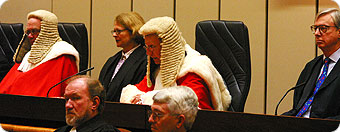FEATURE ARTICLE -
Case Notes, Issue 43: Aug 2010
 CIVIL APPEALS
CIVIL APPEALS
Bli Bli # 1 P/L & Anor v Kimlin Investments P/L & Anor [2010] QCA 136 Holmes JA Fraser JA White JA 4/06/2010
General Civil Appeal from the Supreme Court, Trial Division — Procedure — Supreme Court Procedure — Procedure Under the Rules of Court — Pleading — Statement of Claim — The plaintiffs appealed against orders striking out allegations in their fourth amended statement of claim dated 19 June 2009 and requiring them to give further particulars of other allegations in that pleading — The pleaded dispute arises out of an alleged joint venture agreement to acquire and develop certain land — The primary judge struck out paragraphs pleading a fiduciary relationship between the plaintiffs and the first, second, fourth and fifth defendants — The primary judge referred to Friend v Brooker (2009) 239 CLR 129 and concluded that, whilst there might be grounds for pleading that a fiduciary relationship had arisen, the precedent militated against the manner in which the plaintiffs had pleaded the existence and scope of the duty — His Honour struck the relevant paragraphs on the basis that the relationship pleaded could not arise in the context of the pleading as it stood, and the plaintiffs were given leave to replead — On Appeal — The primary judge’s order potentially affected the plaintiff’s substantive rights and the pleading should not have been struck out unless the absence of a viable cause of action for breach of fiduciary duty was clearly demonstrated — The ground of the primary judge’s decision that Friend v Brooker militated against the manner of the pleading cannot be sustained — The statement from precedent that “equity does not impose fiduciary duties between the parties to a deliberate commercial decision to adopt a corporate structure in which they would owe duties, but to the corporation and as directors” has no application in this case, where the plaintiffs allege that there was a joint venture amongst the plaintiffs and some of the defendants, and where the issue arises at the pleading stage — The claim is not so obviously untenable that it should be rejected at this interlocutory stage of the proceedings — The primary judge ordered that the plaintiffs give further particulars of allegations in specified paragraphs in the fourth amended statement of claim — The admissions of the defendants stand as admissions of the relevant paragraphs in the amended statement of claim — The defendants’ conduct in pursuing their broad request for further particulars of admitted allegations long after the delivery of particulars about which they made no complaint is litigious pedantry — In the absence of evidence that the plaintiffs cannot obtain evidence from an initial co-venturer which would enable them to draft better particulars, the plaintiffs should be ordered to provide the best particulars of a specified paragraph — Held: Appeal allowed, orders made in the trial division on 4 December 2009 set aside, the plaintiffs to give the best particulars they can of the allegation in a specified paragraph, the defendants pay the plaintiffs’ costs of and incidental to the amended application, and the respondents pay the appellants’ costs of the appeal.
 Bergmann v DAW [2010] QCA 143 McMurdo P, Holmes and Muir JJA 11/06/2010
Bergmann v DAW [2010] QCA 143 McMurdo P, Holmes and Muir JJA 11/06/2010
General Civil Appeal from the District Court — Mental Health — Guardians, Committees, Administrators, Managers and Receivers — The respondent signed an Appointment of Real Estate Agent Form, appointing the appellant his agent for the sale of land at Palm Cove on which he was conducting, or had conducted, a hotel and restaurant business (the agency agreement) — The respondent had suffered brain injuries in a motor vehicle accident, with his friend and former physician applying to the Guardianship and Administration Tribunal for an urgent interim order appointing an administrator for the respondent’s financial matters on the grounds that the respondent had impaired decision making abilities — An interim order was made on 11 August 2008 with the Public Trustee of Queensland appointed as administrator for the respondent for all financial matters — On 29 August 2008 the respondent entered into a contract for the sale of land for a sale price of $6,250,000 — On 11 September 2008 the respondent applied through his solicitor for the removal of the administrator, with a declaration that the respondent had capacity to manage “his own financial, legal and personal decisions” — On 16 September 2008 the Tribunal ordered that “the appointment of the Public Trustee of Queensland as administrator” be revoked — The sale did not proceed for reasons which do not appear clearly from the evidence — Nevertheless, on 11 December 2008 the appellant presented the respondent with an invoice for $125,000 on account of the commission allegedly payable under the agency agreement — The respondent refused to pay — The primary judge dismissed the claim on the basis that the making of the interim order took away from the respondent his capacity to enter into a contract for the duration of the order — On Appeal — It is necessarily implicit in ss 12 and 33 of the Guardianship and Administration Act 2000 (Qld) that an administrator for all financial matters assumes the powers in respect of the adult in respect of whom the appointment is made, to the exclusion of the adult, except to the extent that the Tribunal orders otherwise — It was only the administrator who had power to deal with the land during the term of the interim order — The contract was not binding on the respondent — By virtue of Clause 2 of the agency agreement, the appellant’s entitlement to a commission depended on the entering into of a Contract of Sale — The respondent’s lack of competence to enter into the contract arose, not from any want of mental capacity on his part but from the fact that his powers in relation to “financial matters” had passed to his administrator to the exclusion of himself — The contract had no legal force or effect — HELD: Appeal dismissed with costs.
 Strasburger Enterprises (Properties) P/L & Anor v Gold Coast City Council [2010] QCA 153 Holmes JA Chesterman JA White JA 18/06/2010
Strasburger Enterprises (Properties) P/L & Anor v Gold Coast City Council [2010] QCA 153 Holmes JA Chesterman JA White JA 18/06/2010
Application for Leave from the Planning & Environment Court — Environment and Planning — Development Control — Consents, Approvals and Permits — Validity — A service station has been operating at the corner of the Gold Coast Highway and Eighth Avenue, Palm Beach since 1989 — The service station has been conducted pursuant to a Town Planning Permit issued by the Gold Coast City Council on 27 August 1987 which approved an application to erect a service station subject to a number of conditions — The site was initially owned by Esso Australia Ltd who sold the site and business to Mobil Oil Australia Pty Ltd who leased the site — Strasburger has been the lessee and operator of the service station since 24 May 2004 — Prior to this between 30 June 1999 and 24 May 2004 the lessee and operator was Rafinc Pty Ltd who had taken over from Whitepeak Investments Pty Ltd — On 1 March 1995 the Environmental Protection Act 1994 and the Environmental Protection (Interim) Regulation 1995 both came into effect — On 1 March 1998 the Environmental Protection Regulation 1998 commenced with s 5 providing that a person must not carry out a Level 2 activity without approval — On and from 1 July 1998 the EPA was amended with the term “developmental approval” being defined as meaning a development approval under the Integrated Planning Act 1997 — The result of these legislative changes is that after 1 July 1998 carrying out a level 2 environmentally relevant activity could be authorised either by a level 2 approval under the EPA or by a development approval for carrying out the activity under the IPA — Neither Strasburger nor Mobil have ever applied for or obtained an approval for their level 2 (storage of 10,000 litres or more but less than 500,000 litres of petroleum products) activity pursuant to either the EPA or IPA — Strasburger duly made an application which Council approved on 7 September 2007 subject to provisions with the costs of complying exceeding $400,000 — On Appeal — The Council’s decision notice imposes a considerable financial burden on Strasburger and/or Mobil — The appeal raises only questions of statutory construction — There is no doubt that Strasburger carries on a Level 2 activity, storing large volumes of petroleum, on the service station site and has done so continuously since May 2004 — The question comes down to whether the 1987 permit is a developmental approval under the EPA — It is common ground that neither Strasburger nor Mobil ever had any other approval for the storage of petroleum on the service station site — The Court was given six volumes of legislation, almost none of which was referred to, some of which was clearly irrelevant, and some of which was misdescribed — The development approval referred to in s 5 of the 1998 Regulation is an approval for the activity in question (storing large amounts of petrol on the service station site) — There never was such an approval applied for or granted under the legislation — One cannot read the 1987 permit as one issued under or in accordance with, or by reference to the EPA — The Interim Regulation did not attach to the land but applied only to the person then carrying out the activity — The applicants never had an approval under the EPA nor the IPA — On 1 March 1995 the person carrying out the activity was Whitepeak Investments Pty Ltd — The permit did not attach to the land or to its successors in title — Whitepeak ceased carrying on the activity when it quit the premises and Rafinc took over — HELD: Leave to appeal granted, Appeal dismissed with costs.
 Prostitution Licensing Authority v Neilson [2010] QCA 159 McMurdo P and Holmes and Muir JJA 22/06/2010
Prostitution Licensing Authority v Neilson [2010] QCA 159 McMurdo P and Holmes and Muir JJA 22/06/2010
General Civil Appeal from the Supreme Court, Trial Division — Administrative Law — Judicial Review — Grounds of Review — Irrelevant Considerations — Neilson holds a brothel licence pursuant to which she may lawfully operate a brothel in premises at Woolloongabba — In April 2009, she was charged with a number of prostitution offences relating to the carrying on of an illegal escort business unconnected with the licensed brothel, as well as offences of attempting to procure another person to destroy evidence and unlawful assault occasioning bodily harm — Under s 27 and s 29 of the Prostitution Act 1999 (Qld), the Prostitution Licensing Authority suspended her licence for a period of 12 months, a decision which was set aside on a judicial review application — The Authority appeals that decision in particular the part of his Honour’s judgment where he states “there needs to be shown some adverse connection between the allegations and the licensee’s privilege in holding the licence” — On Appeal — His Honour stated (with respect) the obvious: that if the alleged criminal activity bore no relationship to the appropriateness of the licensee’s continuing enjoyment of the privilege, it could not warrant disciplinary action in relation to the licence — The learned judge regarded evidence as to Neilson’s exemplary management of the brothel as relevant to her character and to the larger question of public interest — The policy of the Prostitution Act is to promote the public interest by ensuring that brothels are safe and lawful — The Authority failed to recognise the respect in which the consideration that the brothel was well managed was relevant: as going to the public interest in the maintenance of safe, legal, properly run establishments — It was a relevant consideration to which it did not have regard, as the learned judge correctly found — HELD: Appeal dismissed with costs.
 CRIMINAL APPEALS
CRIMINAL APPEALS
R v Hennessy [2010] QCA 142 Fraser and White JJA and Mullins J 11/06/2010
Application for Extension (Conviction) from the District Court — On 27 October 2008 the applicant pleaded guilty and was sentenced to imprisonment for a number of offences including stalking (18 months), a breach of a domestic and family violence order (no sentence imposed), possession of amphetamine (six months) and two counts of break and enter (two and a half years for each) — All sentences were to be served concurrently with a parole release date fixed at 26 January 2009 — On Appeal — The applicant wished to appeal his conviction in order to withdraw his plea of guilty in respect of the stalking and domestic violence orders only — His reason for seeking to do so is that he had a complete defence to those charges — Support is found in a forensic psychiatrist’s report dated 8  December 2009 that in the psychiatrist’s opinion at the time the applicant engaged in the conduct constituting the offence of stalking, he was of unsound mind within the meaning of s 27 of the Criminal Code — It was uncontroverted that the applicant was of sound mind when he made his pleas of guilty on 27 October 2008 — The psychiatrist concluded that the long persistence of the applicant’s psychotic symptoms while in custody without access to illicit drugs indicated that the correct diagnosis was schizophrenia not a drug-induced psychosis — Had the court below been in possession of the psychiatrist’s unequivocal opinion about the applicant’s criminal responsibility for the stalking offence and the summary offence associated with the stalking, it is unlikely that his Honour would have accepted the pleas of guilty to those offences — Had the applicant been aware of the psychiatrist’s diagnosis even though, in fact, he was concerned about his mental status, he may not have entered those pleas of guilty — HELD: Time extended for the applicant to appeal his convictions for unlawful stalking and for the breach of a domestic violence order.
December 2009 that in the psychiatrist’s opinion at the time the applicant engaged in the conduct constituting the offence of stalking, he was of unsound mind within the meaning of s 27 of the Criminal Code — It was uncontroverted that the applicant was of sound mind when he made his pleas of guilty on 27 October 2008 — The psychiatrist concluded that the long persistence of the applicant’s psychotic symptoms while in custody without access to illicit drugs indicated that the correct diagnosis was schizophrenia not a drug-induced psychosis — Had the court below been in possession of the psychiatrist’s unequivocal opinion about the applicant’s criminal responsibility for the stalking offence and the summary offence associated with the stalking, it is unlikely that his Honour would have accepted the pleas of guilty to those offences — Had the applicant been aware of the psychiatrist’s diagnosis even though, in fact, he was concerned about his mental status, he may not have entered those pleas of guilty — HELD: Time extended for the applicant to appeal his convictions for unlawful stalking and for the breach of a domestic violence order.
 R v Frank [2010] QCA 150 McMurdo P Muir JA Cullinane J 18/06/2010
Appeal against Conviction from the Supreme Court, Trial Division — Appeal and New Trial — Verdict Unreasonable or Insupportable Having Regard to the Evidence — Frank was convicted of murder after a three day trial — The deceased died from a single stab wound behind the left collarbone, which punctured his left lung — A day after the killing the appellant was interviewed by the police — Prior to this interview, her blood alcohol reading was zero — The appellant informed the police that she and her girlfriends did not have arguments with anyone that night, nobody was hurt and she knew nothing about the stab wound to the chest of the deceased — The appellant did not give or call evidence — There was no discussion between the judge and counsel as to how the jury should be directed about the appellant’s plainly untrue statements to police that she was not involved in and knew nothing of the altercation with the deceased resulting in his stabbing and death — Each of her three drinking companions gave evidence as to what happened — Each account differed, no doubt in part to their intoxication — There was evidence that the appellant was intoxicated at the time of the offence , being variously described as being “off her face” and “a little bit pretty drunk” — On Appeal — Whether the appellant intended to cause grievous bodily harm to the deceased when she stabbed him was the central question for the jury — The jury were entitled to conclude that the only rational inference from the evidence was that the appellant, in using the knife during her altercation with the deceased, formed the intention, although a drunken momentary intention, to injure him in a way that was likely to, at least, cause permanent injury to his health — The appellant’s untruthful statements to police were a significant part of the evidence at trial — Unfortunately, counsel did not follow the High Court’s recommendation in Zoneff v The Queen (2000) 200 CLR 234 and discuss the directions to be given to the jury as to lies prior to the commencement of addresses — The jury should have received some guidance from the judge as to how to use the untruthful statements — At the minimum the judge in the present case should have given the jury a direction of the kind referred to in Zoneff, with appropriate adaptations — The absence of an appropriate direction as to the appellant’s lies has deprived the appellant of a chance of an acquittal and so has resulted in a miscarriage of justice — HELD: Appeal against conviction allowed, Guilty verdict for murder set aside, A re-trial ordered.
R v Frank [2010] QCA 150 McMurdo P Muir JA Cullinane J 18/06/2010
Appeal against Conviction from the Supreme Court, Trial Division — Appeal and New Trial — Verdict Unreasonable or Insupportable Having Regard to the Evidence — Frank was convicted of murder after a three day trial — The deceased died from a single stab wound behind the left collarbone, which punctured his left lung — A day after the killing the appellant was interviewed by the police — Prior to this interview, her blood alcohol reading was zero — The appellant informed the police that she and her girlfriends did not have arguments with anyone that night, nobody was hurt and she knew nothing about the stab wound to the chest of the deceased — The appellant did not give or call evidence — There was no discussion between the judge and counsel as to how the jury should be directed about the appellant’s plainly untrue statements to police that she was not involved in and knew nothing of the altercation with the deceased resulting in his stabbing and death — Each of her three drinking companions gave evidence as to what happened — Each account differed, no doubt in part to their intoxication — There was evidence that the appellant was intoxicated at the time of the offence , being variously described as being “off her face” and “a little bit pretty drunk” — On Appeal — Whether the appellant intended to cause grievous bodily harm to the deceased when she stabbed him was the central question for the jury — The jury were entitled to conclude that the only rational inference from the evidence was that the appellant, in using the knife during her altercation with the deceased, formed the intention, although a drunken momentary intention, to injure him in a way that was likely to, at least, cause permanent injury to his health — The appellant’s untruthful statements to police were a significant part of the evidence at trial — Unfortunately, counsel did not follow the High Court’s recommendation in Zoneff v The Queen (2000) 200 CLR 234 and discuss the directions to be given to the jury as to lies prior to the commencement of addresses — The jury should have received some guidance from the judge as to how to use the untruthful statements — At the minimum the judge in the present case should have given the jury a direction of the kind referred to in Zoneff, with appropriate adaptations — The absence of an appropriate direction as to the appellant’s lies has deprived the appellant of a chance of an acquittal and so has resulted in a miscarriage of justice — HELD: Appeal against conviction allowed, Guilty verdict for murder set aside, A re-trial ordered.
 Morton v Queensland Police Service [2010] QCA 160 McMurdo P, Holmes and Chesterman JJA 25/06/2010
Application for Leave from the District Court of Queensland (s 118 DCA (Criminal)) — Human Rights — Racial Discrimination — The applicant was found guilty in the Magistrates Court at Townsville under s 168B(1) Liquor Act (Qld) of possessing two bottles of bourbon whisky in a restricted area of Palm Island — She was convicted and fined $150 with no conviction being recorded, with an order forfeiting the bourbon to the Crown — Her appeal to the District Court was refused — On Appeal — It may be accepted that s 168B, together with its application to Palm Island by s 173G and s 173H of the Act and the terms of the Regulation are discriminatory on the ground of race — Their effect is to prohibit the inhabitants of Palm Island from possessing more than the specified type and quantity of alcohol — The inhabitants of Palm Island are overwhelmingly Aboriginal — The Racial Discrimination Act 1975 (Cth) must be seen as the discharge by the Commonwealth of its obligation, by legislation, to bring racial discrimination to an end — The definition of racial discrimination in Article 1 of the International Convention on the Elimination of All Forms of Racial Discrimination is very wide but not unlimited — One gains an understanding of the nature of those rights from Article 5 which, although not exhaustive, indicates the tenor of such rights — It is difficult to see how a right not to be subjected to any discrimination by act of parliaments can be regarded as a right to equal treatment before tribunals etc administering justice — Parliament when it passed the Liquor Act was not a tribunal or organ administering justice — Article 5(a) does not confer upon the applicant a right to control Parliament with respect to the laws it passes, or a right to be unaffected by any law made by Parliament, which by its terms, applies to her — Her rights with respect to legislation are those conferred by s 10 of the RD Act — The focus of Article 26 of the International Covenant on Civil and Political Rights is on equal treatment before the law, or equal protection of the law — Section 10 of the RD Act is a provision which aims to achieve that goal — Whatever role Article 26 might play in assisting to understanding the Convention it cannot give to Articles 1(1) and 5 of the Convention a meaning which they plainly do not have — The rights of which s 10 speaks are human rights and fundamental freedoms which one can identify by reference to the Convention — The right to possess liquor is not such a right — Given the terms of the explanatory memorandum and the nature of the Liquor Act provisions in question it cannot be doubted that the provisions are a special measure — They were obviously meant to advance rights recognised by Article 5 of the Convention, namely (b), the right to security of person and protection by the State against violence or bodily harm; and (e)(iv) the social right to public health — HELD: Leave to appeal granted, Appeal dismissed.
Morton v Queensland Police Service [2010] QCA 160 McMurdo P, Holmes and Chesterman JJA 25/06/2010
Application for Leave from the District Court of Queensland (s 118 DCA (Criminal)) — Human Rights — Racial Discrimination — The applicant was found guilty in the Magistrates Court at Townsville under s 168B(1) Liquor Act (Qld) of possessing two bottles of bourbon whisky in a restricted area of Palm Island — She was convicted and fined $150 with no conviction being recorded, with an order forfeiting the bourbon to the Crown — Her appeal to the District Court was refused — On Appeal — It may be accepted that s 168B, together with its application to Palm Island by s 173G and s 173H of the Act and the terms of the Regulation are discriminatory on the ground of race — Their effect is to prohibit the inhabitants of Palm Island from possessing more than the specified type and quantity of alcohol — The inhabitants of Palm Island are overwhelmingly Aboriginal — The Racial Discrimination Act 1975 (Cth) must be seen as the discharge by the Commonwealth of its obligation, by legislation, to bring racial discrimination to an end — The definition of racial discrimination in Article 1 of the International Convention on the Elimination of All Forms of Racial Discrimination is very wide but not unlimited — One gains an understanding of the nature of those rights from Article 5 which, although not exhaustive, indicates the tenor of such rights — It is difficult to see how a right not to be subjected to any discrimination by act of parliaments can be regarded as a right to equal treatment before tribunals etc administering justice — Parliament when it passed the Liquor Act was not a tribunal or organ administering justice — Article 5(a) does not confer upon the applicant a right to control Parliament with respect to the laws it passes, or a right to be unaffected by any law made by Parliament, which by its terms, applies to her — Her rights with respect to legislation are those conferred by s 10 of the RD Act — The focus of Article 26 of the International Covenant on Civil and Political Rights is on equal treatment before the law, or equal protection of the law — Section 10 of the RD Act is a provision which aims to achieve that goal — Whatever role Article 26 might play in assisting to understanding the Convention it cannot give to Articles 1(1) and 5 of the Convention a meaning which they plainly do not have — The rights of which s 10 speaks are human rights and fundamental freedoms which one can identify by reference to the Convention — The right to possess liquor is not such a right — Given the terms of the explanatory memorandum and the nature of the Liquor Act provisions in question it cannot be doubted that the provisions are a special measure — They were obviously meant to advance rights recognised by Article 5 of the Convention, namely (b), the right to security of person and protection by the State against violence or bodily harm; and (e)(iv) the social right to public health — HELD: Leave to appeal granted, Appeal dismissed.




 CIVIL APPEALS
CIVIL APPEALS  Bergmann v DAW
Bergmann v DAW Strasburger Enterprises (Properties) P/L & Anor v Gold Coast City Council
Strasburger Enterprises (Properties) P/L & Anor v Gold Coast City Council Prostitution Licensing Authority v Neilson
Prostitution Licensing Authority v Neilson CRIMINAL APPEALS
CRIMINAL APPEALS December 2009 that in the psychiatrist’s opinion at the time the applicant engaged in the conduct constituting the offence of stalking, he was of unsound mind within the meaning of s 27 of the Criminal Code — It was uncontroverted that the applicant was of sound mind when he made his pleas of guilty on 27 October 2008 — The psychiatrist concluded that the long persistence of the applicant’s psychotic symptoms while in custody without access to illicit drugs indicated that the correct diagnosis was schizophrenia not a drug-induced psychosis — Had the court below been in possession of the psychiatrist’s unequivocal opinion about the applicant’s criminal responsibility for the stalking offence and the summary offence associated with the stalking, it is unlikely that his Honour would have accepted the pleas of guilty to those offences — Had the applicant been aware of the psychiatrist’s diagnosis even though, in fact, he was concerned about his mental status, he may not have entered those pleas of guilty — HELD: Time extended for the applicant to appeal his convictions for unlawful stalking and for the breach of a domestic violence order.
December 2009 that in the psychiatrist’s opinion at the time the applicant engaged in the conduct constituting the offence of stalking, he was of unsound mind within the meaning of s 27 of the Criminal Code — It was uncontroverted that the applicant was of sound mind when he made his pleas of guilty on 27 October 2008 — The psychiatrist concluded that the long persistence of the applicant’s psychotic symptoms while in custody without access to illicit drugs indicated that the correct diagnosis was schizophrenia not a drug-induced psychosis — Had the court below been in possession of the psychiatrist’s unequivocal opinion about the applicant’s criminal responsibility for the stalking offence and the summary offence associated with the stalking, it is unlikely that his Honour would have accepted the pleas of guilty to those offences — Had the applicant been aware of the psychiatrist’s diagnosis even though, in fact, he was concerned about his mental status, he may not have entered those pleas of guilty — HELD: Time extended for the applicant to appeal his convictions for unlawful stalking and for the breach of a domestic violence order. R v Frank [2010] QCA 150 McMurdo P Muir JA Cullinane J 18/06/2010
R v Frank [2010] QCA 150 McMurdo P Muir JA Cullinane J 18/06/2010  Morton v Queensland Police Service [2010] QCA 160 McMurdo P, Holmes and Chesterman JJA 25/06/2010
Morton v Queensland Police Service [2010] QCA 160 McMurdo P, Holmes and Chesterman JJA 25/06/2010